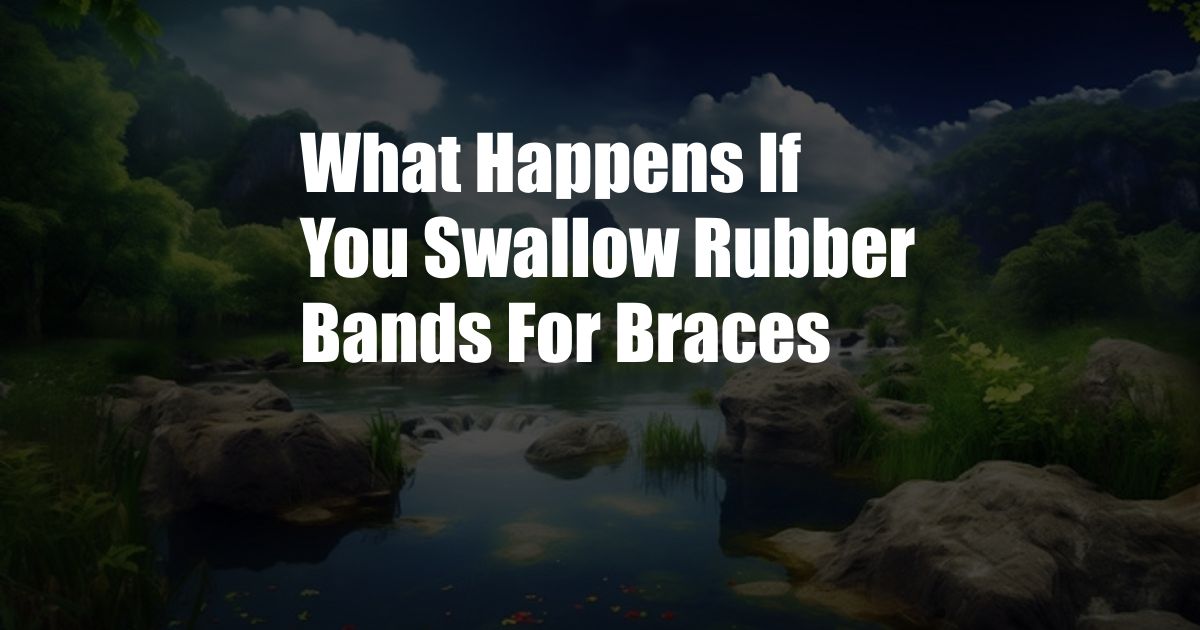
What Happens If You Swallow a Rubber Band for Braces?
Rubber bands play a vital role in orthodontic treatments, helping align teeth and achieve the desired smile. However, accidentally swallowing one can raise concerns and prompt questions about its potential consequences. In this comprehensive guide, we delve into the topic, exploring what happens when a rubber band is ingested, its potential risks, and the necessary steps to take.
Understanding the Risks of Swallowing a Rubber Band
Swallowing a rubber band for braces is generally not a life-threatening situation. However, it can lead to certain complications, especially if the band becomes lodged in the digestive tract. Symptoms may include abdominal pain, nausea, and difficulty passing stool. In rare cases, a swallowed rubber band can cause an intestinal obstruction, requiring medical intervention.
Impact on Braces Treatment
Besides potential health risks, swallowing a rubber band can also impact your orthodontic treatment. The missing band may affect the alignment process, potentially prolonging the treatment duration and compromising the desired results. Therefore, it is crucial to inform your orthodontist immediately if you accidentally swallow a rubber band.
Comprehensive Guide to Swallowing Rubber Bands
The digestive system plays a crucial role in processing ingested items, including swallowed rubber bands. Here’s a detailed explanation of the process:
1. Esophagus
Upon swallowing, the rubber band enters the esophagus, a muscular tube connecting the mouth to the stomach. The esophagus uses rhythmic contractions to propel the band downward.
2. Stomach
Once in the stomach, the rubber band is exposed to acidic juices that help break down food. The stomach’s churning motions further assist in disintegrating the band.
3. Small Intestine
From the stomach, the rubber band travels to the small intestine, where most of the nutrients are absorbed. The band may continue to break down as it moves through the small intestine.
4. Large Intestine
The remaining components of the rubber band eventually reach the large intestine, responsible for absorbing water and electrolytes. It is here where the band may become lodged, causing potential complications.
5. Elimination
Typically, the rubber band will pass through the digestive system and be eliminated in stool within a few days. However, in certain cases, it may remain in the digestive tract for longer periods, necessitating medical attention.
Tips and Expert Advice for Preventing and Managing Swallowed Rubber Bands
To prevent the accidental ingestion of rubber bands, it is essential to follow these expert tips:
1. Secure Placement
Always ensure that rubber bands are securely attached to braces and not loose. Avoid chewing or playing with them, as this can increase the risk of swallowing.
2. Parental Supervision
For younger orthodontic patients, parental supervision is crucial. Children may be more likely to experiment with rubber bands, potentially leading to accidental ingestion.
3. Stay Hydrated
Drinking plenty of fluids aids in digestion and helps the rubber band move smoothly through the digestive tract, reducing the risk of complications.
4. Medical Consultation
If you suspect that you have swallowed a rubber band, seek medical advice immediately. Describe your symptoms and the incident to the healthcare professional.
Frequently Asked Questions (FAQs) on Swallowing Rubber Bands
Q: What should I do if I swallow a rubber band for braces?
A: Inform your orthodontist and consult a healthcare professional promptly.
Q: Can swallowing a rubber band cause serious health problems?
A: While generally not life-threatening, swallowed rubber bands can potentially lead to intestinal obstruction, requiring medical intervention.
Q: How long does it take for a swallowed rubber band to pass through the body?
A: Typically within a few days, but it may vary depending on individual circumstances.
Q: Can I remove a swallowed rubber band myself?
A: Do not attempt to remove a swallowed rubber band yourself. Seek medical assistance for proper extraction.
Conclusion
Understanding what happens if you swallow a rubber band for braces and the potential risks involved is crucial for orthodontic patients. By following expert advice, adhering to recommended practices, and seeking timely medical attention when necessary, you can minimize the likelihood of complications and ensure a smooth orthodontic journey.
Is the topic of swallowing rubber bands for braces something you’re interested in learning more about? Share your thoughts and questions in the comments section below.